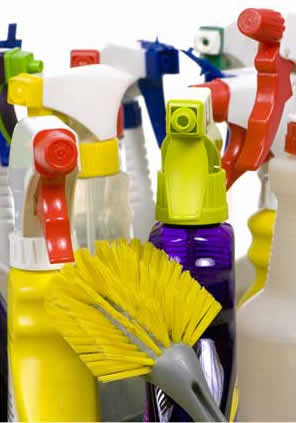 |
Hazardous waste is toxic (e.g., pesticides, mercury), flammable (paint thinner, nail polish remover), corrosive (acids, drain cleaner) or reactive (explosive or can generate deadly vapors like certain pool chemicals). If it spills or containers leak, hazardous waste can harm people and pollute the environment. |
“Better living through chemistry” has a downside – many chemicals like solvents and pesticides are hazardous. Leftovers or use can result in waste that is also hazardous. Prior to the 1980s, most hazardous waste was dumped in landfills, poured down drains, burned, or buried in unlined pits. Pollution at places like Love Canal in NY brought national attention to the consequences of improperly managing toxic waste. This prompted the U.S. Environmental Protection Agency to issue hazardous waste regulations, under the Resource Conservation and Recovery Act, or RCRA.
RCRA regulations focus on commercial wastes because they pose the highest risk and are generated in the highest volumes. However, some of the exact same items regulated under RCRA are probably under your sink, or in your basement or garage. Since the volumes are smaller and there are so many households, the federal government figured it would be too hard to regulate the household hazardous waste (HHW) stream.
That doesn’t mean it doesn’t pose a problem. Half a million different products containing chemicals are available for use in homes. (Source: FEMA). American households generate an estimated 1.6 million tons of HHW per year – that’s about 30 pounds per household. (Source: EPA). Many of the 2.6 million poisonings reported each year happen when young children get into these chemicals. (Source: National Center for Health Statistics, 2002). In 2002, 20,000 children drank laundry bleach. Another 5,000 swallowed gasoline, in some cases because the fuel was stored in a soda bottle. People have contaminated their own wells by dumping hazardous waste on the ground, and wiped out beneficial bacteria in their septic tanks by pouring HHW down the drain. Thus, it’s no wonder that a lot of people are anxious to get these toxic, corrosive, ignitable or reactive dangers out of their houses. But what to do with them?
HOUSEHOLD HAZARDOUS WASTE COLLECTION DAY
Saturday, June 21, 9 a.m. – 1 p.m.
THOMPSON RESIDENTS ONLY
Thompson Highway Dept., 225 Buckley Hill Road
Bring a driver’s license to prove residency. Not for commercial or industrial hazardous waste generators.
Limit: 20 gallons or 20 lbs. total.
Items not accepted include latex paint, ammunition & fireworks. For more information, call 923.9561. |
HHW Collection Days to the rescue! Each year, a number of towns organize collection days so locals can drop off HHW to be managed in a safe, convenient and environmentally responsible way. Statewide, more than 30,000 residents participate in a HHW collection day each year (Source: CT DEP, 2005). "Citizens can do their part to ensure that trash is as free as possible from chemicals by taking advantage of such collections, and by purchasing less hazardous products in the future," notes Robert Isner, Director of Waste Engineering and Enforcement at DEP.
Here are some tips to prevent pollution and keep people safe.
- Think before you buy. Do you really need that chemical? Is there another product you can use that would be less dangerous to your family and less harmful for the environment?
- Make sure you buy the right type of product for the job.
- Buy only what you need, in order to minimize leftovers.
- Follow ALL the instructions on the label for use, storage and disposal.
- Store any leftovers in tightly closed, original containers that are in good condition, with readable labels. Keep them in a cool dry place, out of reach of children and pets.
- Instead of disposing of unused product, see if there is someone else who can safely make use of it.
- Whatever you do, don’t mix, burn, bury or pour hazardous chemicals on the ground or throw them in the trash.
- To find out whether there is an HHW collection day scheduled for your town, call your public works department, or search the CT DEP website at www.ct.gov/dep for “household hazardous waste collection.”
|

